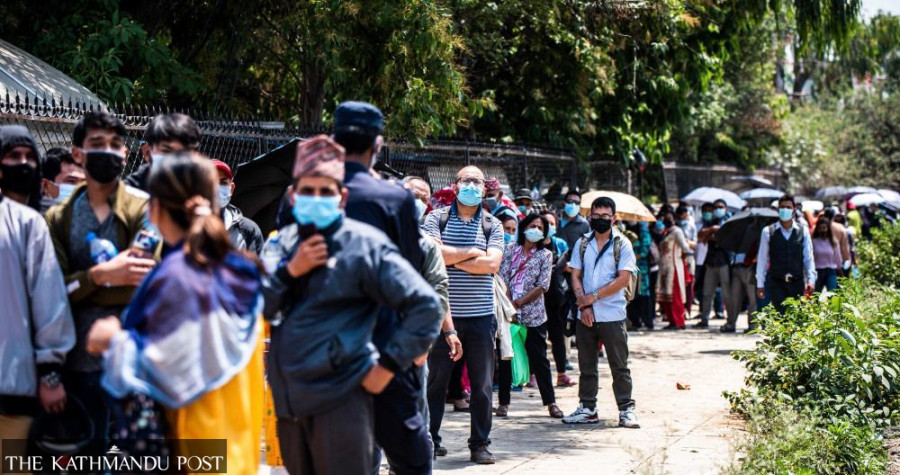Health
Crowds at vaccine centres risk further spread of the virus, doctors warn
Despite vaccines arriving from different countries, there is chaos outside every vaccination centre.
Shuvam Dhungana
On July 17, Tara Dangal of Gothatar reached Mulpani Primary Health Centre located in Ward 6, to get inoculated against Covid-19. However, she returned home without getting the jab after seeing a huge crowd outside the health centre.
“I went to the centre at around 9 in the morning but when I reached there, I saw a huge crowd outside. Many people had reached there as early as 6 am,” said the 37-year-old.
“I wanted to get vaccinated as I have to travel daily for my work from Mulpani to Balaju. But I got scared after seeing the crowd,” said Dangal. “People were pushing each other. There was no social distancing. The queue was for the registration of names and to get tokens for the vaccine.”
Despite vaccines arriving from different countries, there is chaos outside every vaccination centre. Meanwhile, authorities seem to be wary of managing the crowds and vaccinating people in a safer way.
Kathmandu Chief District Officer Kali Prasad Parajuli seemed unaware of the crowds at the vaccination centre.
Asked why the authorities have not done anything yet, he replied that the local governments were supposed to manage crowds at vaccination centres.
According to Krishna Hari Thapa, mayor of Kageshwori Manahara Municipality, they had set up nine vaccination centres in the municipality to minimise crowds, but that did not work.
Due to the limited number of vaccine doses and a large number of unvaccinated people, all vaccine centres were overcrowded.
“We have mobilised police personnel and scouts to manage the crowd,” said Thapa.
Public health experts have warned that immunisation programmes could turn into spreader events if the crowds are not managed.
Covid-19 cases are already surging, with the Health Ministry confirming 3,218 new cases in the past 24 hours on Saturday. Similarly, 987 people tested positive in antigen tests.
In its regular situation report, the ministry did not mention the death toll over the past 24 hours. It, however, reported 19 Covid-19-related fatalities, which included the number of deaths managed by Nepal Army on different dates.
As of Saturday, the nationwide infection tally has reached 712,740 while the death toll stands at 10,038. The number of active cases stands at 35, 432.
According to Dr Sher Bahadur Pun, chief of the Clinical Research Unit at Sukraraj Tropical and Infectious Disease Hospital at Teku, people are scrambling to get the Covid-19 shots because the Delta variant of the coronavirus is spreading rapidly all over the world.
“Authorities concerned should act to limit the risk of infections at overcrowded vaccine centres, or else the consequence could be catastrophic,” Pun warned.
Pun also advised the members of the public not to rush to vaccine centres as more vaccines are on the way.
Nepal on Saturday received 513,420 doses of AstraZeneca vaccine provided by the Japan government through the COVAX facility, an international vaccine-sharing scheme backed by the United Nation.
So far, Nepal has received 10,526,270 doses of vaccine from various sources.
Nepal so far has used Covishield, Vero Cell, developed and manufactured by China’s Sinopharm, and Janssen by Johnson & Johnson to inoculate its population against Covid-19.
Of the 5.8 million doses of Vero Cell, 4 million doses Nepal bought from China while 1.8 million doses were provided by the Chinese government under grant assistance.
On July 12, the United States provided 1,534,850 doses of Janssen through the COVAX facility.
COVAX itself had supplied 348,000 doses of Covishield to Nepal on March 7.
As of Saturday, 4,442,622 people have received their first doses (around 14.8 percent) and 2,359,793 people have been fully vaccinated (7.86 percent).




 11.84°C Kathmandu
11.84°C Kathmandu















